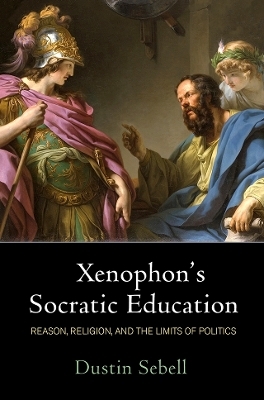
Xenophon's Socratic Education
Reason, Religion, and the Limits of Politics
Seiten
2021
University of Pennsylvania Press (Verlag)
978-0-8122-5285-9 (ISBN)
University of Pennsylvania Press (Verlag)
978-0-8122-5285-9 (ISBN)
A careful reading of Book IV of Xenophon's Memorabilia and a demonstration of a Socratic education
It is well known that Socrates was executed by the city of Athens for not believing in the gods and for corrupting the youth. Despite this, it is not widely known what he really thought, or taught the youth to think, about philosophy, the gods, and political affairs. Of the few authors we rely on for firsthand knowledge of Socrates—Aristophanes, Xenophon, Plato, and Aristotle—only Xenophon, the least read of the four, lays out the whole Socratic education in systematic order.
In Xenophon's Socratic Education, through a careful reading of Book IV of Xenophon's Memorabilia, Dustin Sebell shows how Socrates ascended, with his students in tow, from opinions about morality or politics and religion to knowledge of such things. Besides revealing what it was that Socrates really thought—about everything from self-knowledge to happiness, natural theology to natural law, and rhetoric to dialectic—Sebell demonstrates how Socrates taught promising youths, like Xenophon or Plato, only indirectly: by jokingly teaching unpromising youths in their presence. Sebell ultimately shows how Socrates, the founder of moral and political philosophy, sought and found an answer to the all-important question: should we take our bearings in life from human reason, or revealed religion?
It is well known that Socrates was executed by the city of Athens for not believing in the gods and for corrupting the youth. Despite this, it is not widely known what he really thought, or taught the youth to think, about philosophy, the gods, and political affairs. Of the few authors we rely on for firsthand knowledge of Socrates—Aristophanes, Xenophon, Plato, and Aristotle—only Xenophon, the least read of the four, lays out the whole Socratic education in systematic order.
In Xenophon's Socratic Education, through a careful reading of Book IV of Xenophon's Memorabilia, Dustin Sebell shows how Socrates ascended, with his students in tow, from opinions about morality or politics and religion to knowledge of such things. Besides revealing what it was that Socrates really thought—about everything from self-knowledge to happiness, natural theology to natural law, and rhetoric to dialectic—Sebell demonstrates how Socrates taught promising youths, like Xenophon or Plato, only indirectly: by jokingly teaching unpromising youths in their presence. Sebell ultimately shows how Socrates, the founder of moral and political philosophy, sought and found an answer to the all-important question: should we take our bearings in life from human reason, or revealed religion?
Dustin Sebell is Associate Professor in the Department of Political Science at Michigan State University. He is author of The Socratic Turn: Knowledge of Good and Evil in an Age of Science, also available from University of Pennsylvania Press.
Acknowledgments
Introduction
Part One
Chapter 1. Socratic Rhetoric
Chapter 2. Can Politics Be Taught?
Part Two
Chapter 3. Justice and the Weakness of Writing
Chapter 4. Self-Knowledge and the Hope for Happiness
Part Three
Chapter 5. "Natural Theology"
Chapter 6. "Natural Law"
Chapter 7. The Foundation of Wisdom
Chapter 8. The (Rhetorical Treatment of the) Dialectical Method
Chapter 9. Human Wisdom and Divine Providence
Notes
Index
| Erscheinungsdatum | 24.02.2021 |
|---|---|
| Verlagsort | Pennsylvania |
| Sprache | englisch |
| Maße | 152 x 229 mm |
| Themenwelt | Geisteswissenschaften ► Philosophie ► Ethik |
| Geisteswissenschaften ► Philosophie ► Philosophie Altertum / Antike | |
| ISBN-10 | 0-8122-5285-3 / 0812252853 |
| ISBN-13 | 978-0-8122-5285-9 / 9780812252859 |
| Zustand | Neuware |
| Haben Sie eine Frage zum Produkt? |
Mehr entdecken
aus dem Bereich
aus dem Bereich
unsere kollektive Verantwortung
Buch | Hardcover (2023)
wbg Theiss in Wissenschaftliche Buchgesellschaft (WBG) (Verlag)
CHF 46,90


